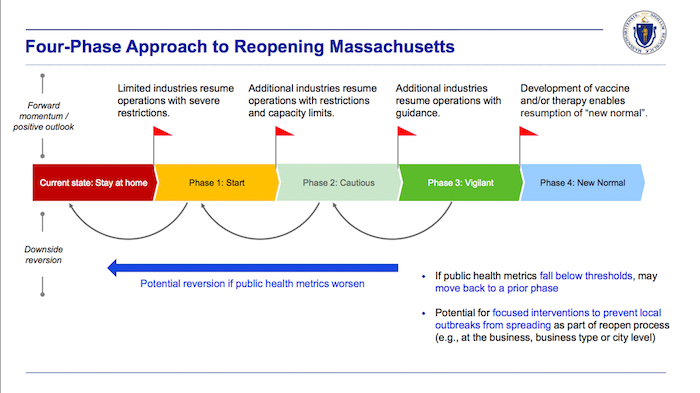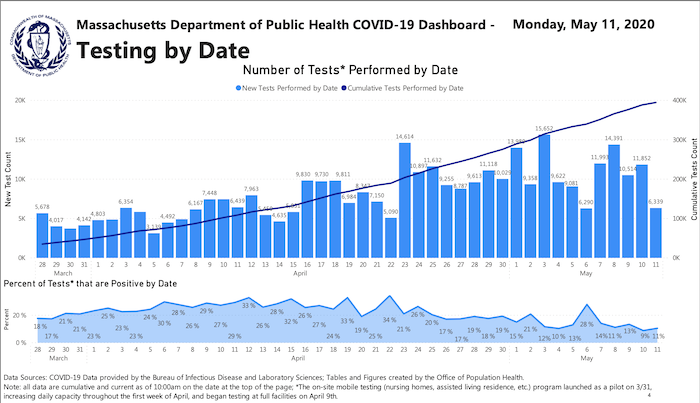Coalition releases 10 point emergency plan for Massachusetts prisons and jails
The following release was released by the Massachusetts Communities Action Network:
Today, a coalition of 22 community groups held a press conference to release a 10 Point Emergency Plan for addressing the rapid spread of COVID-19 infections in Massachusetts prisons and jails. Top recommendations include accelerating the release of those who have reached or are within six-months of reaching their parole eligibility date and granting medical paroles to those who are eligible.
“Compassion needs to be the North Star by which we navigate the crisis. Just as in the HIV epidemic, lives will be lost because of governmental inaction toward a politically unpopular group,” said Michael Cox, Director of Policy for Black and Pink, Boston (formerly incarcerated).
Massachusetts prisons have one of the highest rates of COVID-19 infection in the country. The release of incarcerated people is urgently needed to reduce overcrowding and we must provide people with safe places to go. It is the only effective way to stem the health emergency in our prisons and jails affecting those incarcerated, corrections officers and their families, and other staff.
Currently, it is not possible to maintain social distancing within the Commonwealth’s prisons and jails. According to the MA Department of Corrections, 72% of incarcerated people sleep, and 70% eat within 6 feet of each other. As a result, infections are spreading quickly.
Already, infection rates are high at many facilities. According to WBUR, at MTC Bridgewater 25% of those tested were positive; at MCI-Shirley, 54% of those tested were positive; and at MCI-Framingham, 37% of the total incarcerated population of roughly 200 women were positive.
“Decarceration is not just about public health safety, it’s about being humane. If they were good enough to assist the public, i.e. essential workers, by answering the clarion call to make sanitizer and other protective items available, than their safety is just as important,” said Rev. David Lewis of Pioneer Valley Project and Co-Chair of today’s Press Conference.
“The abuse, neglect, and dehumanization that prisons perpetuate has only been heightened during this pandemic, a time in this country where we have chosen to honor doctors and nurses for saving lives, but Governor Baker, the Department of Correction, the Massachusetts Parole Board have chosen to allow our loved ones behind the wall to suffer and some to die alone. That cannot be the way any longer,” said Jasmin Borges from Families for Justice as Healing.
Governor Baker must take urgent action to halt the rapid spread of COVID-19 in our correctional facilities. Without swift intervention, infections will continue to spread among those incarcerated, correction officers and their families, and out into our communities.
To date, 15 other Governors from a wide variety of states – including California, Illinois, North Dakota, West Virginia, New York, Pennsylvania, Rhode Island, and Washington – have begun to release at least some targeted incarcerated people, but Governor Baker has not yet taken action.
Data on coronavirus infections in prisons and jails can be found at https://data.aclum.org/sjc-12926-tracker/
As a result of structural racism, significant racial disparities exist between the prison population in Massachusetts and the state’s population as a whole. According to the MA Department of Correction, in 2017 incarcerated individuals in Massachusetts were 49% White, 26% Black, and 23% Hispanic. This compares to the statewide population the same year: 80% White, 8.9% Black, and 12.3 % Hispanic.
“Solitary confinement is a public health emergency in itself. We’ve been fighting to reform this practice for many years. We cannot manage one public health crisis with another. Decarceration is the only way to keep our people safe,” said Cassandra Bensahih, coordinator for Massachusetts Against Solitary Confinement (formerly incarcerated person). She noted that currently most prisons are locked down 23 hours in cells which is like solitary confinement for all.
“Public Health is a field that uses data and evidence. That is why public health experts in this state and across the country are calling for decarceration. We know that people who are incarcerated cannot follow public health practices to keep themselves safer and we know that the psychological and physical outcomes of forced isolation and solitary only replace one public health crisis with another. Decarceration is the best and only public health strategy to protect incarcerated people and communities”, said Carlene Pavlos, Director of MA Public Health Association and co-chair of the press conference.
“Governor Baker has not made any type of effort to look at a Clemency application. My time in Framingham was unbearable. I know women in prison are suffering right now while Governor Baker turns his back on their pain. We need to release people right now. We can do so much better than this. We can invest in housing, healthcare, and relief funding for formerly incarcerated people rather than senseless incarceration.” -Stacey Borden, New Beginnings Re-Entry Services and Families for Justice as Healing
Organizations participating in this Press Conference include:
Families for Justice as Healing, MA Public Health Association, Pioneer Valley Project, Prisoners Legal Services, Committee for Public Counsel Services, American Civil Liberties Unions of MA, Black and Pink, New England Innocence Project, World Peace Institute associated with Tufts University, National Association of Social Workers, JALSA, Mayor’s Office of Returning Citizens, Greater Boston Legal Services, Progressive Massachusetts, Community Resources for Justice, UU Mass Action, Massachusetts Bail Fund, Public Health Institute of Western Massachusetts, Coalition for Social Justice, Unlock Housing Coalition, New Beginnings Re-Entry Services, Massachusetts Communities Action Network
Ten Actions to Support Public Health Through Decarceration
Decarceration is the best and only way to protect people who are incarcerated, correction officers, and communities during this public health emergency. Urgently releasing as many people as is possible will help slow the spread of the virus and allow for social distancing. Actions that Governor Baker, his appointed Parole Board, and the Department of Correction must take swiftly:
1. Grant parole to qualifying individuals who have reached or are within six-months of reaching their parole eligibility date, review parole decisions for those previously denied parole, and grant requests for medical parole to eligible people.
2. Expedite previously-made parole approvals, and review those whose parole has been revoked for technical violations.
3. Withdraw warrants for minor parole infractions and return people to their home plans.
4. Use clemency powers to release people who are medically vulnerable and whose release would be in the interest of public health and public safety pose no threat to the community.
5. Enable the DOC to similarly utilize its furlough process to release individuals who are within 6 months of completing their sentences or who are medically vulnerable.
Lack of housing should not be used as a reason people cannot be released. The Governor should:
6. Induce or compel cooperation from public and private educational institutions, and hotel and motel owners to increase available living space to quarantine new releases and those who are homeless. Provide funding for support services, food, security for this housing.
7. Issue guidance to local housing authorities and landlords who contract with them to accept people being released from custody who wish to reside with their spouses, parents, or friends in these settings.
8. Working with the Executive Office of Health and Human Services, enable DPH hospitals and licensed facilities to accept those approved for release pursuant to medical parole.
For those who remain incarcerated, solitary confinement is not an appropriate or legal remedy. The Governor should:
9. Ensure that the Department of Correction tests and retests all incarcerated people and staff for COVID-19, and provide everyone with masks and/or shields, safe medication dispensation, soap, cleaning supplies, tissues, extra uniforms free of charge, free phone calls, free emails, and daily outside recreation time.
10. Order an end to the long-term lockdown/solitary confinement conditions as they are an inappropriate means of protecting the health and safety of individuals and a violation of state law and the 8th Amendment of the U.S. Constitution.
Additional Concerns to be Addressed:
Most of the people being held in county jails haven’t been convicted of their charges but are held there because they are unable to pay bail or on a parole violation. Yet county jails are most likely to hold people crowded together. Sheriffs need to work together with DAs and judges to free many more, as if it were a matter of life and death – because it is.
Bristol, Franklin, and Plymouth House of Corrections also hold ICE (Immigration and Custom Enforcement) detainees that ICE wants to deport. They have not been convicted of crimes yet. Recent pictures at Bristol House of Correction shows a cramped dorm of bunk beds close together which is clearly unsafe for social distancing. Officials including Governor Baker must press Sheriff Hodgson to change these conditions and the state needs to offer testing for all people held and all staff in county prisons and jails.


